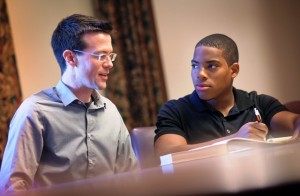Juannell Riley ’15 (Bronx, N.Y.) spent the semester investigating who speaks—and whose voice matters—in democratic communities.

Professor Michael Feola and Juannell Riley ‘15 work in Kirby Hall of Civil Rights.
Riley worked with Michael Feola, assistant professor of government & law, through Lafayette’s EXCEL Scholars undergraduate research program on a project that challenges longstanding assumptions about democracy and citizenship.
The team grappled with the widespread belief that challenges to democracy arise only when certain groups are not permitted to participate in debates over laws and policies. They are, in familiar terms, silenced. The idea driving the project is that this contrast (speech vs. silence) cannot adequately account for more subtle processes of exclusion. Perhaps more common, Feola says, are cases where groups are formally permitted to take part in the political process, but their voices have no force in the conversations through which policy is made, benefits distributed, and burdens assigned.
“So, this is the knot that we’ve been trying to untangle,” he says. “What are the mechanisms through which some groups are permitted to speak, yet systematically do not matter? How do dynamics of race, gender, sexuality, or class ensure that their words lack authority, no matter how loudly they express their interests? How does this generate damaged forms of citizenship?”
A double major in government & law and philosophy, Riley versed himself in a wide set of theories and cases—and his findings took their studies in an unexpected direction. Recently, the pair began exploring ways in which those whose voices bear little political weight turn instead to creative strategies, such as hunger strikes, occupying space, or other kinds of public spectacle to insert themselves more forcefully into social conversations. These strategies challenge not only what political communication is, but what it could yet be.
Riley, who aspires to be a lawyer and later enter politics, benefited from the exposure to many political sentiments and topics, from poverty to feminism. He is a more meticulous reader, he says, able to catch key details at a rate he couldn’t before. His time-management skills have also grown, which helps as he juggles competing in track & field with classwork, research, volunteering in tax preparation for low-income individuals, and writing satire.
“I believe that as a lawyer and as a politician I’ll need to be able to read a lot, understand it quickly, and apply it to current assignments and objectives. EXCEL has equipped me with these skills,” he says.
“He has not only done a nice job exploring this difficult, complex terrain,” says Feola, “but he’s been asking some really sophisticated questions along the way. He has done invaluable work in the project.”
Riley majored in government & law out of pure interest in the field and due to his career ambitions. His major in philosophy, he says, helps him to become a better thinker.
